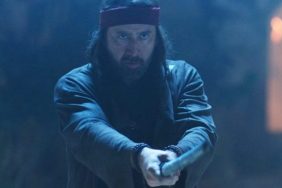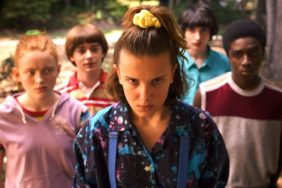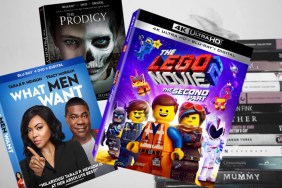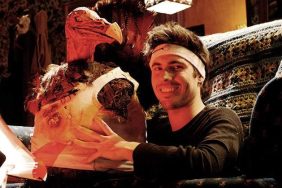The Two Faces of January played at the Los Angeles Film Festival in June. It was the directorial debut of acclaimed screenwriter Hossein Amini, who also adapted the screenplay based on the Patricia Highsmith novel. Viggo Mortensen stars as Chester, an American con artist traveling in Greece with his wife Colette (Kirsten Dunst). When private detective comes after him, a local man (Oscar Isaac) helps Chester and Colette flee, but complications arise when the trio are on the road together. The Two Faces of January hits VOD on August 28 before its September 26 theatrical release. I interviewed Amini at LAFF this summer.
Related: Los Angeles Film Film Festival 2014 Recap
CraveOnline: I have not read the Highsmith book. Is every location in the film as described in the book?
Hossein Amini: No, the ending in the book is in Paris. Ryal and Chester end up in France but I just thought I wanted them to get further and further away from America. I thought particularly Chester, the idea that he’s going from a place where he’s comfortable and in control, further and further east until he’s in a place where people are hunting him. He’s sort of stripped down in every way. The world around him is more and more hostile. I thought Paris was effectively going back towards home geographically, so that was the biggest change really in terms of locations.
As far as Greece, the temple…
That’s exactly in the book. It was just the ending.
How did you handle lighting in the labyrinth?
We shot the outside at the labyrinth itself. Underneath was a set. There’s no way they would’ve let us film. They were generally really hard to get permission to film in all of those places, understandably I guess.
In the book, what is Chester’s crime?
It’s exactly the same crime but Chester’s quite different in the book. He’s the same character but in the book you start off knowing, it describes him as being slightly overweight and an alcoholic, badly dressed. I wanted him to con the audience almost at the beginning, a more Fitzgerald thing of being a bit like Gatsby where you think he’s like this golden figure coming out of the Parthenon, this very wealthy guy. Then you start to realize he’s not what he seems. In the book, you know what he is at the beginning. So that was a change.
But it was written in the ‘80s. Was he still a Wall Street con artist?
He was a different con artist. There was a con where he was selling Hoovers or something. I made it less specific. I read about other cons that were going on at the time and is seemed to be selling shares to things that didn’t exist seemed to be quite a common one. In the book, there’s some specific invention of the Hoover that he invents and sells to people. It just seemed too small for the kind of Chester that I wanted, the more Gatsby Chester that I was trying to get in the beginning of the movie so I gave him a bigger con that he was responsible for.
Did you want to say something about Wall Street frauds?
I kind of read a lot about it but I suppose in a way it’s so much about the character dynamics and stuff, I kind of wanted to hint about it. The Madoff thing I obviously read books about him and tried to get a little bit about, but I couldn’t fit it in too much. I think the book was so not about that. It was really a MacGuffin I guess. Apart from that one scene he has with the private detective, I couldn’t really find the place to exactly know what was going on on Wall Street.
Given that’s what we’ve been dealing with for the last few years, it wasn’t an agenda of yours?
No, no, it wasn’t. In a way it took me so long to get the thing done that I’d already started working on it before everything broke in terms of the crash and all that’s gone on. Reading back, I realized there’s such a tradition of those guys anyway, the history of those guys. It’s suddenly back in the news but there’s a brilliant book I read about con men in the ‘30s and even in the ‘60s when this film happened, there was a lot of those guys. I think there’s a crash in ’61 or something where a lot of these guys got found out.
Chester never even asks how much money the private detective wants. It probably could have been very little to him. Is it not even about the money to him?
I think it’s that thing that they both know that he stole from his investors. It’s almost an unspoken understanding between them that he wants all the money, everything he has back. Those two characters I felt, that’s why I put in the little bit about the army, that they’re both ex-mercenaries as well, that connection. I felt it was interesting that they knew and didn’t really have to talk about it. Chester knows how much money he has and the other guy knows he’s going to walk away with all his money.
That one shot when you focus on Viggo gripping the bed frame, was that inspired by Nicolas Winding Refn?
It wasn’t really. That was something that Viggo did at the time. I found with the actors, with Oscar as well, the scene I have in the ferry when the two of them are staring at each other, I could see them working themselves up into moods and I’d always thought as a director you go in and tell them what you want. Sometimes I learned that it was best to stay away and see what they were going to try to do. That bedroom scene, things where he’s squeezing the bed frame and also when he’s ruffling the sheets and smelled his fingers, that was all really Viggo. We let the camera roll and watched him and then decided where to put the camera afterwards. There were days where it was much more discussion and whatever, but other days they’re such great actors I think just watching what they come up with was really fascinating.
It just reminded me of the glove from Drive.
Nic I learned a lot from in terms of that whole thing of being collaborative on set. He was the first director who included me in the conversations with actors for example or took me on location scouts. I think he was so confident in himself, a lot of directors I think don’t like having screenwriters too close. I think Nic was so confident that I was staying with him in L.A. and working with the actors and we’d chat about the parts and then go off and see a location. He was more inspiring to me in terms of how he behaved I think as a director rather than his specific aesthetic.
So when Kirsten rolls her eyes, is that something she came up with too?
Yes, yeah, yeah. Sometimes you refine it, just say a little bit less or a little bit more. The whole trusting of actors, and that was something else Nic did a lot when I watched him on set. He was very happy to let actors try what they wanted to do and then he’d step in and refine it. That was my favorite thing, was working with the actors.
At the junket for Only God Forgives, Nicolas was talking about possibly doing a Drive 2 and then later he admitted he was joking all along. Were you bummed that there wasn’t really going to be a Drive 2?
Not really, because I didn’t really know what the sequel is and what the story is. I think James Sallis wrote a really great follow up to it but I couldn’t see the movie there. The movies that inspired me when I was writing the script were either Samurai or some of those westerns. It’s tough to see a sequel, but if Nic said, “I’ve got a really great idea for a sequel,” then I’m off to do it. I can’t see what the sequel is and I think we were so lucky with that movie. It was going to be buried and then suddenly it got lovely responses at the L.A. Film Festival and at Cannes and had this great film life. I don’t know if lightning strikes twice with those movies.
I understand 47 Ronin had a number of problems and was delayed a lot. What was your role in the scripting of that?
It was very similar to Snow White and the Huntsman where I came on quite late. They were almost in preproduction. I watched a ton of samurai movies because that’s what I was really interested in. Once they started shooting I had very little [involvement] and I knew it was in trouble, but I didn’t know what was going on. Certainly things like the dragon I didn’t realize they were reshooting. There was a lot of reshoots that I wasn’t at all involved in but I think that’s the nature of when you do those. There’s so much at stake money-wise with those big studio movies that it’s very hard for me to be precious about what was changed and what wasn’t. It’s painful because I really love those kinds of movies. I love samurai movies but there’s a whole rhythm. Every samurai movie I’ve watched is very slow for the first half to three quarters, then there’s an amazing fight at the end. I don’t know if that’s necessarily going to translate into a big studio movie.
Were you surprised that you became hired for big studio action movies like 47 Ronin and Snow White and the Huntsman when you started out writing Wings of the Dove and Jude?
Yeah, I was. Again, I think I get hired for those sort of things usually quite late. I don’t think I’d ever get hired to start those movies. It tends to be they want a character polish or it’s quite specific. They already know what they want at the stage that I come on. Yeah, I am surprised but I find them very hard. They’re not easy. I think their whole responsibility, Drive was initially a studio commission and it was quickly put into turnaround because it was too dark and too violent. So the whole commercial thing I do struggle with a little bit. I mean, I love watching them but I don’t know if I could ever initiate them.
How different has each author been to adapt, from Highsmith to Henry James and Thomas Hardy?
They’re all different. The one thing I think they all share and makes me want to adapt them is the incredible characters. I think when you’ve got incredible characters, they’re the root to the story. It’s very easy for me adapting to write a new scene or invent a new plotline and, I think, still stay faithful to the book because I think the characters are so well drawn that it’s very easy to imagine what they’d say, what they’d do in an invented scene. I think all the adaptations I’ve done, there are scenes that didn’t exist in the book but the characters are so well drawn that they’re very easy to write in some ways.
What’s a new scene in The Two Faces of January?
The scene with the little girl on the bus wasn’t in the book. Some of the earlier stuff. The detective’s arrival, the acropolis scene wasn’t in the book. He sees them at a museum somewhere and they don’t really talk or get to meet each other before the body. That book, it was again the characters, particularly Chester’s character. I’d never read a book where my allegiances towards a character changed so much through the course of the story. And also one where, I think there are lots of movies about dark characters but not dark characters who are quite fragile emotionally. I found him a really fascinating villain because of that. He wasn’t particularly brilliant. He wasn’t the smartest. He was very, very human. I just found that intriguing. It really got under my skin.
Would you remember what scenes you created for Wings of the Dove that weren’t in the book?
Most scenes were created because it was all told retrospectively. I’d say 70-80% of the scenes are invented. They’re told to you retrospectively by characters describing scenes and then I had to go and write the scenes. The sex scene at the end is exactly the same dialogue in the book, but in the book there’s no sex scene. They’re at a mantelpiece saying exactly the same words and they’re breaking up, but I remember when I read the book I thought, “Oh my God, that feels exactly what it’s like to be in bed with someone that you’re falling out of love with and you try to make it right by having sex and it doesn’t work.” Even though it’s a very different scene in the book, I just felt it was a contemporary version of what was always there.
Fred Topel is a staff writer at CraveOnline and the man behind Best Episode Ever and The Shelf Space Awards. Follow him on Twitter at @FredTopel.







